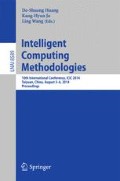Abstract
In this paper, a bayesian statistical inference-based estimation of distribution algorithm (BEDA) is proposed for the re-entrant job-shop scheduling problem with sequence-dependent setup times (RJSSPST) to minimize the maximum completion time (i.e., makespan), which is a typical NP hard combinatorial problem with strong engineering background. Bayesian statistical inference (BSI) is utilized to extract sub-sequence information from high quality individuals of the current population and determine the parameters of BEDA’s probabilistic model (BEDA_PM). In the proposed BEDA, BEDA_PM is used to generate new population and guide the search to find promising sequences or regions in the solution space. Simulation experiments and comparisons demonstrate the effectiveness of the proposed BEDA.
Access this chapter
Tax calculation will be finalised at checkout
Purchases are for personal use only
Preview
Unable to display preview. Download preview PDF.
References
Garey, M.R., Johnson, D.S., Sethi, R.: The Complexity of The Flowshop And Jobshop Scheduling. Computer Science Department 1(2), 117–129 (1976)
Sun, J.U.: A Genetic Algorithm for A Reentrant Job-shop Scheduling Problem with Sequence-dependent Setup Times. Engineering Optimization 41(6), 505–520 (2009)
Karg, L.L., Thompson, G.L.: A Heuristic Approach to The Traveling Salesman. Management Science 10(2), 225–248 (1964)
Adams, J., Balas, E., Zawack, D.: The Shifting Bottleneck Procedure for Job Shop Scheduling. Management Science 34(3), 391–401 (1988)
Baluja, S.: Population-based Incremental Learning: A Method for Integrating Genetic Search Based Function Optimization And Competitive Learning. Technical Report CMU-CS-94-193. Carnegie Mellon University, Pittsburgh (1994)
Salhi, A., Rodriguez, J.A.V., Zhang, Q.F.: An Estimation of Distribution Algorithm with Guided Mutation for A Complex Flow Shop Scheduling Problem. In: Proceedings of the 9th Annual Conference on Genetic and Evolutionary Computation, London, UK, pp. 570–576 (2007)
Wang, S.Y., Wang, L., Zhou, G., Xu, Y.: An Estimation of Distribution Algorithm for The Flexible Job-shop Scheduling Problem. In: Huang, D.-S., Gan, Y., Gupta, P., Gromiha, M.M. (eds.) ICIC 2011. LNCS (LNAI), vol. 6839, pp. 9–16. Springer, Heidelberg (2012)
Liu, H., Gao, L., Pan, Q.K.: A Hybrid Particle Swarm Optimization with Estimation of Distribution Algorithm for Solving Permutation Flowshop Scheduling Problem. Expert Systems with Applications 38(4), 4348–4360 (2011)
Wang, L., Wang, S.Y., Xu, Y., Zhou, G., Liu, M.: A Bi-population Based Estimation of Distribution Algorithm for The Flexible Job-shop Scheduling Problem. Computers & Industrial Engineering 62(4), 917–926 (2012)
Zhou, A., Gao, F., Zhang, G.: A Decomposition Based Estimation of Distribution Algorithm for Multiobjective Traveling Salesman Problems. Computers and Mathematics with Applications 66(10), 1857–1868 (2013)
Ruiz, R., Maroto, C., Alcaraz, J.: Two New Robust Genetic Algorithms for The Flowshop Scheduling Problem. Omega 34(5), 461–476 (2006)
Huelsenbeck, J.P., Ronquist, F.: MrBayes: Bayesian Inference of Phylogenetic Trees. Bioinformatics 17(8), 754–755 (2001)
Qian, B., Li, Z.H., Hu, R., Zhang, C.S.: A Hybrid Differential Evolution Algorithm for The Multi-objective Reentrant Job-shop Scheduling Problem. In: The 10th IEEE International Conference on Control & Automation, pp. 485–489 (2013)
Zhang, R., Wu, C.: A Hybrid Local Search Algorithm for Scheduling Real-world Job Shops with Batch-wise Pending Due Dates. Engineering Applications of Artificial Intelligence 25(2), 209–221 (2012)
Schiavinotto, T., Stützle, T.: A Review of Metrics on Permutations for Search Landscape Analysis. Computers & Operations Research 34(10), 3143–3153 (2007)
Author information
Authors and Affiliations
Editor information
Editors and Affiliations
Rights and permissions
Copyright information
© 2014 Springer International Publishing Switzerland
About this paper
Cite this paper
Chen, SF., Qian, B., Liu, B., Hu, R., Zhang, CS. (2014). Bayesian Statistical Inference-Based Estimation of Distribution Algorithm for the Re-entrant Job-Shop Scheduling Problem with Sequence-Dependent Setup Times. In: Huang, DS., Jo, KH., Wang, L. (eds) Intelligent Computing Methodologies. ICIC 2014. Lecture Notes in Computer Science(), vol 8589. Springer, Cham. https://doi.org/10.1007/978-3-319-09339-0_69
Download citation
DOI: https://doi.org/10.1007/978-3-319-09339-0_69
Publisher Name: Springer, Cham
Print ISBN: 978-3-319-09338-3
Online ISBN: 978-3-319-09339-0
eBook Packages: Computer ScienceComputer Science (R0)

